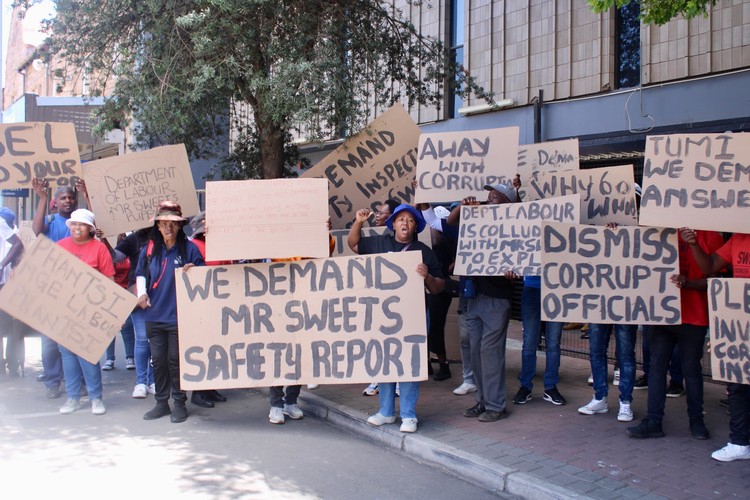
7 November 2024
Workers on strike at Premier’s Mister Sweet factory picketed outside the Department of Labour’s office in Germiston last month to demand a report following an inspection by an official. Archive photo: Kimberly Mutandiro
When Premier’s Mister Sweet workers went on strike over two months ago, *Themba was among a group of unemployed people in Germiston who answered the company’s call for temporary workers.
While Themba had no formal training, he says he was happy for the opportunity to earn R3,000 a week. However, just weeks into the job at the factory, one of Themba’s fingers was cut off.
The finger was stitched back, but he says it is no longer useable and often numb.
Now that the strike has ended, Themba is afraid he may never find a job ever again.
“I’m worried that now I’m as good as disabled.” He said the company had rushed him to hospital after the incident and had paid his medical bill but he did not know if he would receive compensation.
He is one of four casual workers, hired through a labour broker, who were badly injured while filling in for the striking workers over the two-month period.
Earlier this week, Premier spokesperson Siobhan O’Sullivan confirmed that the company had reached a settlement with the striking workers, bringing the 11-week strike to an end. Workers are expected to return to work on Monday.
Jacob Potlaki of the Simunye Workers Forum says the injured casual workers are afraid of not being compensated.
During the strike, the forum voiced its concerns about the company’s use of inadequately trained casual workers tasked with operating large machines. Premier has said the casual workers had been trained before starting work, but Themba told GroundUp he had not been trained.
O’Sullivan also said that injuries that occurred during the strike “were not disabling”. She said when an employee, permanent or casual, gets injured, the company follows a “rigorous process” to report and investigate the incident and “manage the affected employee”.
She said Premier contributes to the Workers’ Compensation Fund (COIDA) to ensure that all employees, whether permanent, contract, or casual, are covered for injuries and diseases contracted on duty. Workforce, which which Premier works, is also registered with the fund, she said.
“All the casual workers were provided with Health and Safety Induction to ensure they are made aware of any hazards and risk situations while performing their duties—this includes not working outside of the scope of their work as well as reporting procedures to follow in the event of equipment malfunctions. Informal practical training is also given to our casual workers,” said O’Sullivan, adding that the injuries were being investigated by the labour department.
*Not his real name.